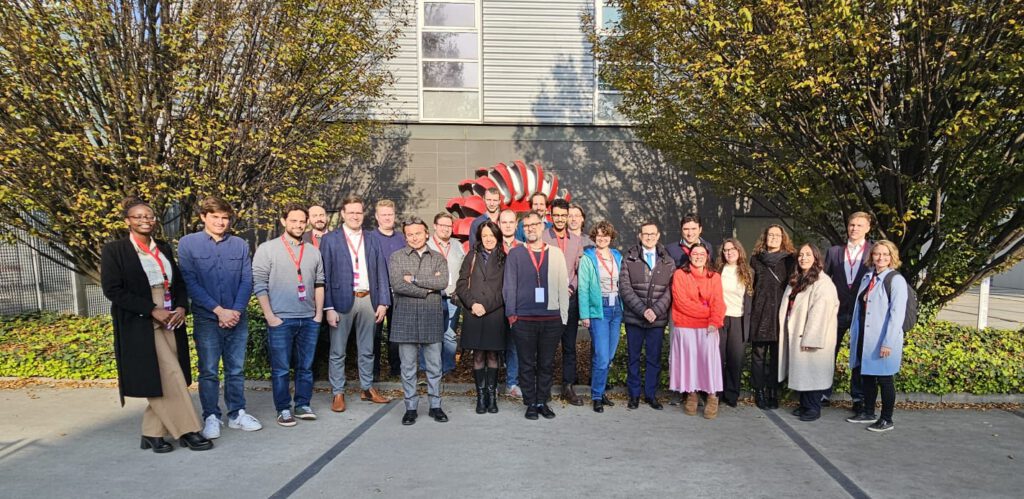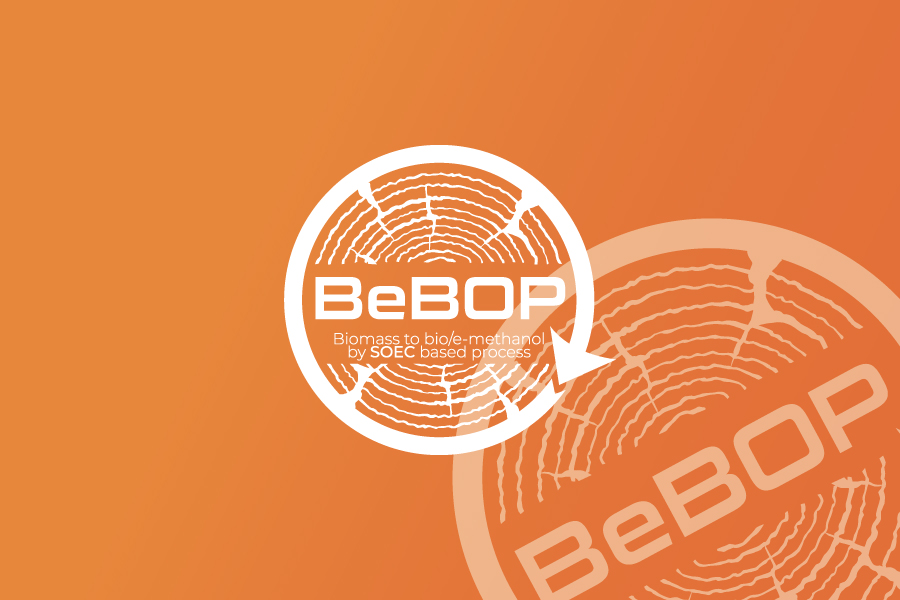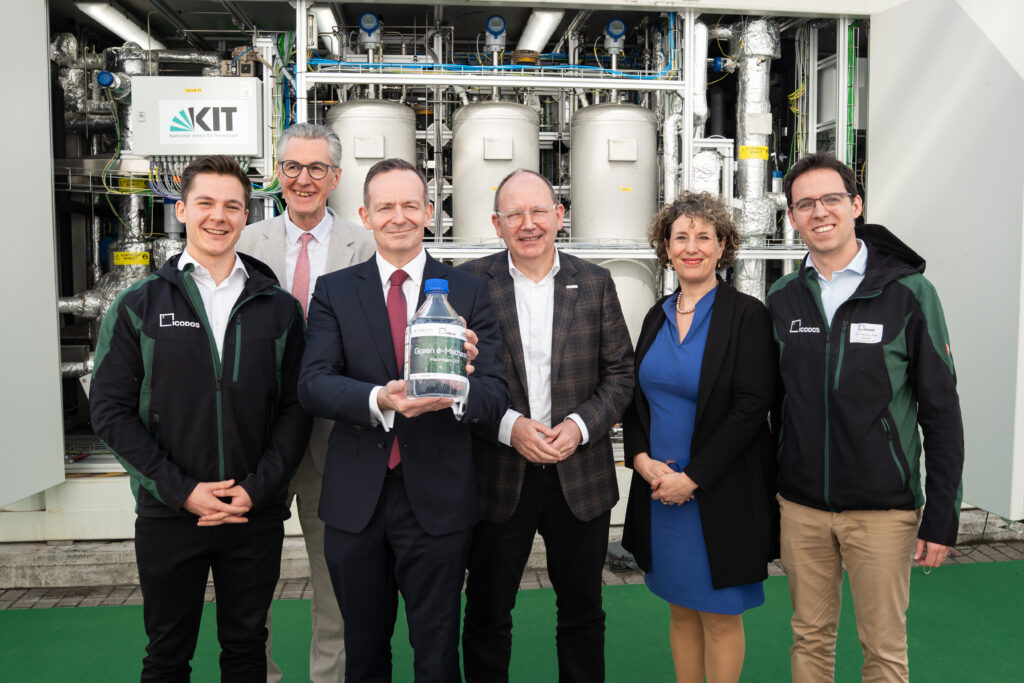The BeBOP project in numbers:
- Start date: 1st October 2024
- Total project duration: 48 months
- Total budget and EU contribution: 11,166,415.71 €
The European Commission awards BeBOP project: ultra-high resource efficiency and flexibility for biomass power-to-methanol plant
Mannheim, Germany, 14/11/2024 – ICODOS is excited to announce its key role in the Horizon Europe-funded BeBOP project, an initiative with a total grant of over €11 million dedicated to demonstrating a revolutionary approach to biomass-to-methanol conversion. The BeBOP project (Grant Agreement 101178117) aims to push the boundaries of sustainable methanol production, targeting unprecedented resource efficiency and carbon retention.
The BeBOP project brings together 12 leading partners from 7 countries, and ICODOS is proud to contribute its cutting-edge process technology. ICODOS will lead the engineering and design of a state-of-the-art 3D-printed reactor. This advanced unit will feature a load-flexible reaction system with excellent heat management that converts syngas from the previous SOEC into methanol.
“ICODOS’ technology for enhanced methanol synthesis will be a cornerstone of the BeBOP project,” said Hannah Kirsch, BeBOP project manager at ICODOS. “We believe this project will set a new standard for the biomass/power-to-methanol sector and accelerate the transition away from fossil-based methanol.”
BeBOP as a key enabler of sustainable methanol production
“Climate change demands cleaner energy sources in the electricity, industrial, and mobility sectors, as well as higher efficiency in resource use. Bio-methanol (produced from biomass) and e-methanol (produced from electricity) can play an important role in decarbonizing the chemical industry and hard-to-electrify mobility,” say Martina Fantini from EUCORE and Matteo Romano from the Department of Energy at Politecnico di Milano, Coordinators of BeBOP. “Methanol is essential in the chemical sector, but most of it is still produced from fossil fuels, which leads to significant CO2 emissions. Replacing fossil feedstocks with sustainable biomass represents a greener alternative. However, conventional biomass-to-methanol processes are ‘carbon inefficient,’ as they release most of the biogenic carbon back into the atmosphere as CO2. BeBOP will pilot an innovative process designed to minimize carbon losses and maximize methanol yield per unit of biomass feedstock”.
In this context, the EU-funded BeBOP project, made up of 12 partners from 7 countries, will work for 4 years to develop a pilot biomass-to-methanol plant at the VTT Research Centre in Finland. The plant will incorporate biomass gasification, deep cleaning of syngas, an integrated electrolysis cell, and methanol synthesis. The most innovative features include the integration of the electrolysis cell with the methanol reactor. This integration will lead to a significant advance in the green transformation of the process industry by enhancing biomass resource efficiency by over 100%. The system will allow for the doubling of methanol productivity, achieve >95% carbon efficiency, recover high-value components from biomass gasification residues, and operate flexibly with the electricity grid in response to electricity price fluctuations and the availability of renewable energy. The project has the potential to prevent over 30 million tonnes of CO2 emissions annually.
BeBOP’s impact will go beyond its immediate objectives by preserving the quality of the end product at competitive costs, reducing GHG emissions, lowering methanol production costs, and creating new direct and indirect jobs. The project also addresses the circularity of the European chemical sector, actively supporting the European Union’s climate neutrality goals and the United Nations Sustainable Development Goals.
About the 12 BeBOP Partners:
EUCORE: EUropean COoperation in Research and is a consulting firm offering partner design, administrative management, reporting, and research services to universities, research centers, companies, public administrations, and non-profit organizations wishing to participate in research and cooperation projects funded by the European Union or other national and international initiatives.
Role in BeBOP: Project Coordinator, leader of dissemination, communication and exploitation activities.
www.eucore.eu.
Politecnico di Milano: One of the largest technical universities in Italy, ranked 1st in Italy and 3rd in the European Union in the 2024 QS World University Rankings for “Engineering and Technology”.
Role in BeBOP: experimental testing of the electrolyse cell, simulation of integrated biomass to methanol plant, carried out at the Department of Energy, Polimi’s strategic research area in the energy sector.
www.polimi.it.
LUT University: Founded in 1969, LUT University is a leader in research and teaching on clean and sustainable technologies, with main campuses in Lappeenranta and Lahti, Finland. The university’s Thermal Engineering laboratory has been involved in EU-funded innovative calcium looping projects since 2010 and is currently active in two EU projects on this topic.
Role in BeBOP: modelling the digital-twins of the BeBOP technology.
www.lut.fi.
VTT: An independent research institution focused on advancing the commercialization and broad application of research and technology in business and society. VTT operates as a non-profit organization.
Role in BeBOP: design and engineering of the pilot plant, operation of the integrated gasifier, electrolyser cell and methanation units.
www.vttresearch.com.
ELCOGEN: Manufacturer of cutting-edge clean energy technology that delivers affordable green hydrogen and emission-free electricity. Their goal is to advance net-zero ambitions through versatile technologies that transform fuel sources into emissions-free energy and convert emission-free energy into cost effective green hydrogen.
Role in BeBOP: design and manufacturing of novel solid oxide cells incorporated to new stack platform, designed for large-scale production.
www.elcogen.com.
ICODOS: German technology development company specializing in the development of technologies for the efficient utilization of biogas and exhaust gases rich in CO2. ICODOS’s innovative process integrates CO2 capture and methanol synthesis to create a hybrid system that enhances CO2 capture efficiency (>95%) while also reducing operating and investment expenses.
Role in BeBOP: engineering and design of the methanol unit equipped with a 3D printed reactor for integration in the pilot plant at VTT.
www.icodos.com.
ECODESIGN: An engineering consultancy based in Vienna focused on ecodesign and the environmental performance of products. The company has ample experience and expertise in conducting Life Cycle Assessment (LCA) according to the international standards ISO 14040 and ISO 14044, and Product Carbon Footprint assessments (PCF) according to ISO 14026.
Role in BeBOP: ensure that both the pilot plant, its components as well as the whole process are designed to incorporate Circular Economy principles. Furthermore the company will apply a LCA not only for the pilot plant, but also a scaled-up process in order to assess its potential future environmental viability.
www.ecodesign-company.com.
INERIS: Ineris (National Institute for Industrial Environment and Risks), established in 1990, is a French public body under the supervision of the ministry of environment. It specializes in assessing and preventing risks associated with economic activities that may impact human health, safety, and the environment. INERIS conducts research and provides expertise in areas such as industrial safety, chemical substance toxicity, air quality, and underground risks. Its mission encompasses evaluating, preventing, and controlling both chronic and accidental risks to ensure the safety of people and property.
Role in BeBOP: risk assessment and cost benefit analysis, handprint analysis for social acceptance.
www.ineris.fr.
WOOD: A prominent international consulting and engineering firm serving the energy and materials sectors. WOOD provides essential knowledge in consulting, projects, and operations and is committed to advancing sustainable development. WOOD is also a participant in the United Nations Global Compact.
Role in BeBOP: scale-up, pre-FEED study and economic analysis of a commercial-scale BeBOP plant. Support exploitation
www.woodplc.com.
Pro-Akademia: With over 20 years of experience in renewable energy, circular economy, energy efficiency, and natural products, Pro-Akademia is a research and innovation center that executes more than 200 projects across various sectors, focusing on SMEs, EU institutions, and municipal and national authorities in Poland.
Role in BeBOP: methods development for extracting trace elements from solid gasification residues, development of methods for the recovery of heavy metals.
www.proakademia.eu.
UNI – Ente Italiano Normazione: A non-profit organization involved in the development, publication, and promotion of voluntary technical standards. UNI ensures the enhancement and uniformity of product and service attributes while upholding ethical standards.
Role in BeBOP: extensive review of existing standards and/or proposal for development of new standardisations documents.
www.uni.com.
Press Contacts
David Strittmatter, ICODOS
Press contact ICODOS
david.strittmatter@icodos.com



